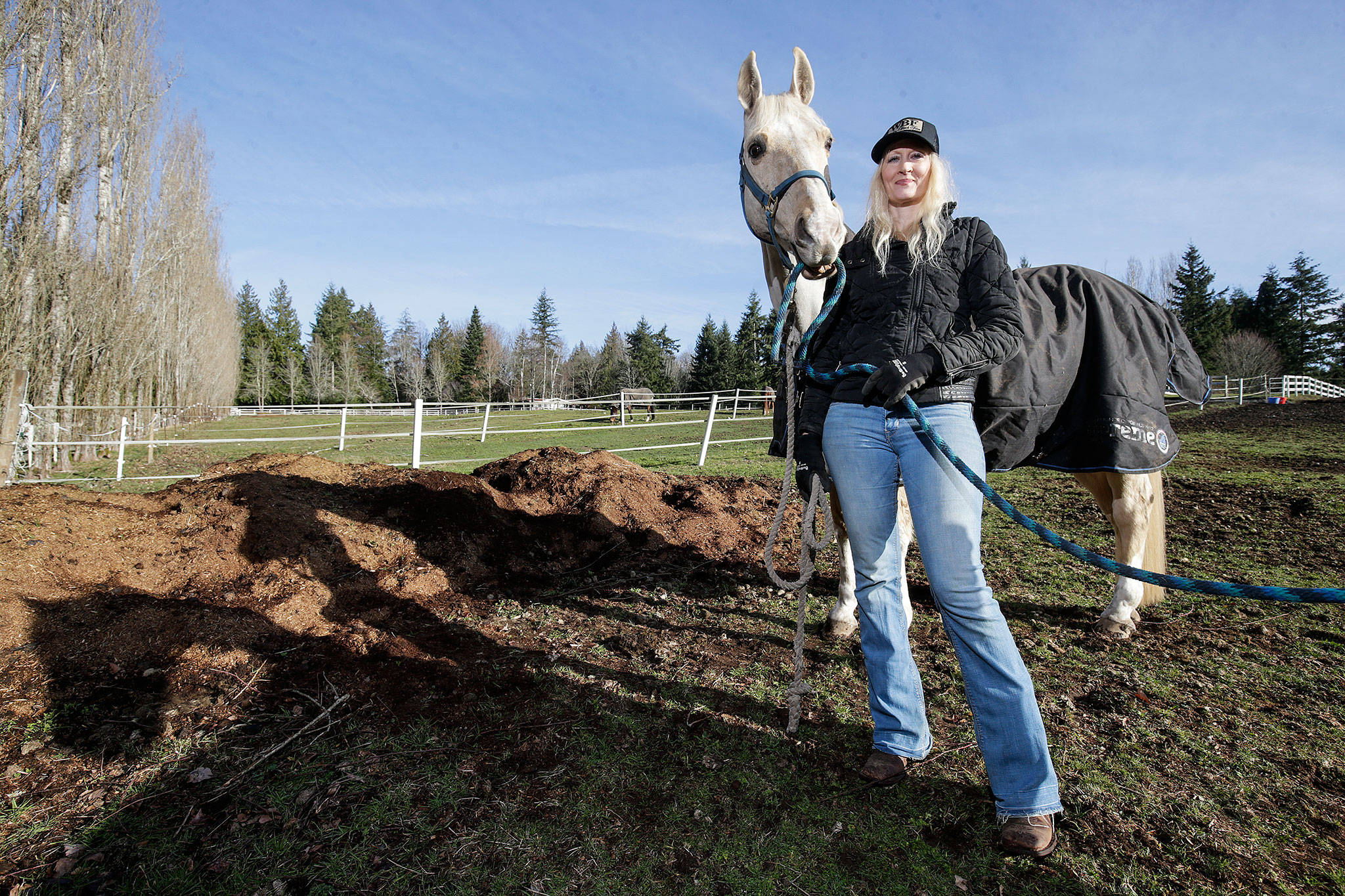TULALIP — At her farm Monday, Melonie Rainey dug her gloved hands into a six-month-old pile of manure on one of her pastures on the north end of the Tulalip Indian Reservation. Her dig revealed rich, black compost.
“Isn’t that gorgeous?” she said.
The pile is part of the system Rainey developed through a Snohomish Conservation District program that helps horse owners manage manure. The initiative aims to reduce river and stream pollution by diminishing runoff from horse waste.
It gained 10 new converts last year, bringing participation to 42 people, and the conservation district hopes to attract more.
Snohomish County enjoys an active equestrian community, with over 3,000 horses and ponies calling this area home. As each grass guzzler generates about 50 pounds of manure daily, equines can produce one cubic foot of waste per day.
Keeping manure under control is one of the biggest environmental needs in the county, said Michael Hipp, a farm planner and equine specialist with the conservation district.
The chemicals in horse waste can be fantastic plant food if applied to soil, but are damaging if they enter ground or surface water, Hipp said.
“Much like oil is good in your engine but bad if it enters the stream,” he said.
Through the district’s “manure spreader” program, Hipp shows property owners how to turn horse waste into fertilizer through composting and to use one of the district’s two manure spreaders — a trailer that distributes compost evenly over pastures.
For most horse owners, Hipp said the first instinct is to pile horse waste near a ditch or in a corner. But that concentrates chemicals, which rain washes into nearby streams and rivers.
“You can’t really blame people,” Hipp said. “Manure is a natural thing. It seems logical to dump it out in nature.”
Composting balances and alters the chemicals in manure, Hipp said, so it’s less damaging to surrounding water. Spreading that compost on pastures also helps the soil absorb rain, preventing erosion and runoff.
In the first step of the program, Hipp tests a property owner’s soil to determine if it is healthy enough to absorb the large dose of nutrients manure provides. He then shows them how to properly compost manure by covering the pile and providing air flow. Beginning in late April and ending in mid October, participants can rent the two manure spreaders.
The method improves ground conditions and provides soil and grass with nutrients — which are then passed on to grazing horses, Hipp said.
Rainey’s palomino-colored horse Joe and one of her barn’s equine residents, a chestnut named Ned, enjoyed one of the program’s benefits on a chilly, sunny morning earlier this week — plentiful green grass.
Two years since beginning the program, Rainey said her pastures stay green and relatively mud-free throughout Western Washington’s soggy winter.
Rainey runs a horse-boarding business, with up to 15 horses at a time on her 11-acre property.
“I’ve had so much grass to the point I might have to be careful how long I leave the horses out on it,” she said.
The animals can become ill from eating too much grass.
Rainey puts her herd out to pasture every day, even after spreading her compost.
It disappears into the ground within a week, she said, and the horses aren’t bothered.
But Rainey wasn’t always a poop-spreading pro.
“When I have a full barn, I literally get a mountain of manure,” Rainey said.
Before learning the conservation district’s method, she said she was running out of options.
Paying someone to haul it out isn’t an expense everyone in the horse-boarding business can afford, she said.
“The county kind of saved me, quite frankly,” she said.
The manure spreader program is part of the district’s larger effort to clean up the county’s surface water, Hipp said.
Several of Snohomish County’s streams and rivers exceed state limits for fecal coliform bacteria, he said.
About five years ago, the county department in charge of monitoring surface water determined a large number of manure piles could be contributing to poor water quality. The conservation district, a tax-supported agency, created the manure spreader program to help address that problem, Hipp said.
With limited equipment and staff, Hipp said he can schedule about 50 participants each year.
The soil test is free, and property owners who sign up can rent one of the spreaders for one week for $70.
When considering the cost of purchasing her own equipment, Rainey said the rental fee is outweighed by the program’s benefits.
“It’s a screaming good deal,” she said.
Julia-Grace Sanders: 425-339-3439. jgsanders@heraldnet.com.
Talk to us
> Give us your news tips.
> Send us a letter to the editor.
> More Herald contact information.

























